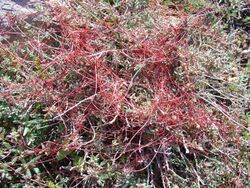Biology:Cuscuta epithymum
| Cuscuta epithymum | |
|---|---|

| |
| Scientific classification | |
| Kingdom: | Plantae |
| Clade: | Tracheophytes |
| Clade: | Angiosperms |
| Clade: | Eudicots |
| Clade: | Asterids |
| Order: | Solanales |
| Family: | Convolvulaceae |
| Genus: | Cuscuta |
| Species: | C. epithymum
|
| Binomial name | |
| Cuscuta epithymum | |
| Synonyms | |
|
Lepimenes epithymum (L.) Raf.[3] | |
Cuscuta epithymum (dodder, lesser dodder, hellweed, strangle-tare) is a parasitic plant assigned to the family Cuscutaceae or Convolvulaceae, depending on the taxonomy. It is red-pigmented, not being photosynthetically active. It has a filiform habit, like a group of yarns. Its leaves are very small, like flakes. Its flowers, disposed in little glomerules, have a white corolla, with the androecium welded to the corolla.
In Eurasia, this species of dodder would often attach itself to the Conehead thyme (Thymus capitatus), taking on the plant's pungency and from whence it also derived its host's Arabic name, al-ṣaʿitrah.[6] During medieval times, dodder was often used as a medicinal cure in treating depression, but causes thirst and dryness of the mouth when consumed.[6]
References
- ↑ "Systema vegetabilium ed 13". 1774. p. 140. http://linnean-online.org/120044.
- ↑ "IPNI Cuscuta epithymum". http://www.ipni.org/ipni/idPlantNameSearch.do?id=267419-1.
- ↑ Govaerts, R. (2018). "Plants of the World online Cuscuta epithymum". Board of Trustees of the Royal Botanic Gardens, Kew. https://powo.science.kew.org/taxon/urn:lsid:ipni.org:names:267419-1.
- ↑ "APNI Cuscuta epithymum". https://biodiversity.org.au/nsl/services/rest/name/apni/90826/api/apni-format.
- ↑ Linnaeus, C. (1753) Species Plantarum 1: 124
- ↑ Jump up to: 6.0 6.1 Amar, Z.; Serri, Yaron (2004) (in he). The Land of Israel and Syria as Described by al-Tamimi – Jerusalem Physician of the 10th Century. Ramat-Gan. pp. 70–72 (note 230). ISBN 965-226-252-8. -- (OCLC 607157392)
External links
Wikidata ☰ Q1479326 entry
 |

